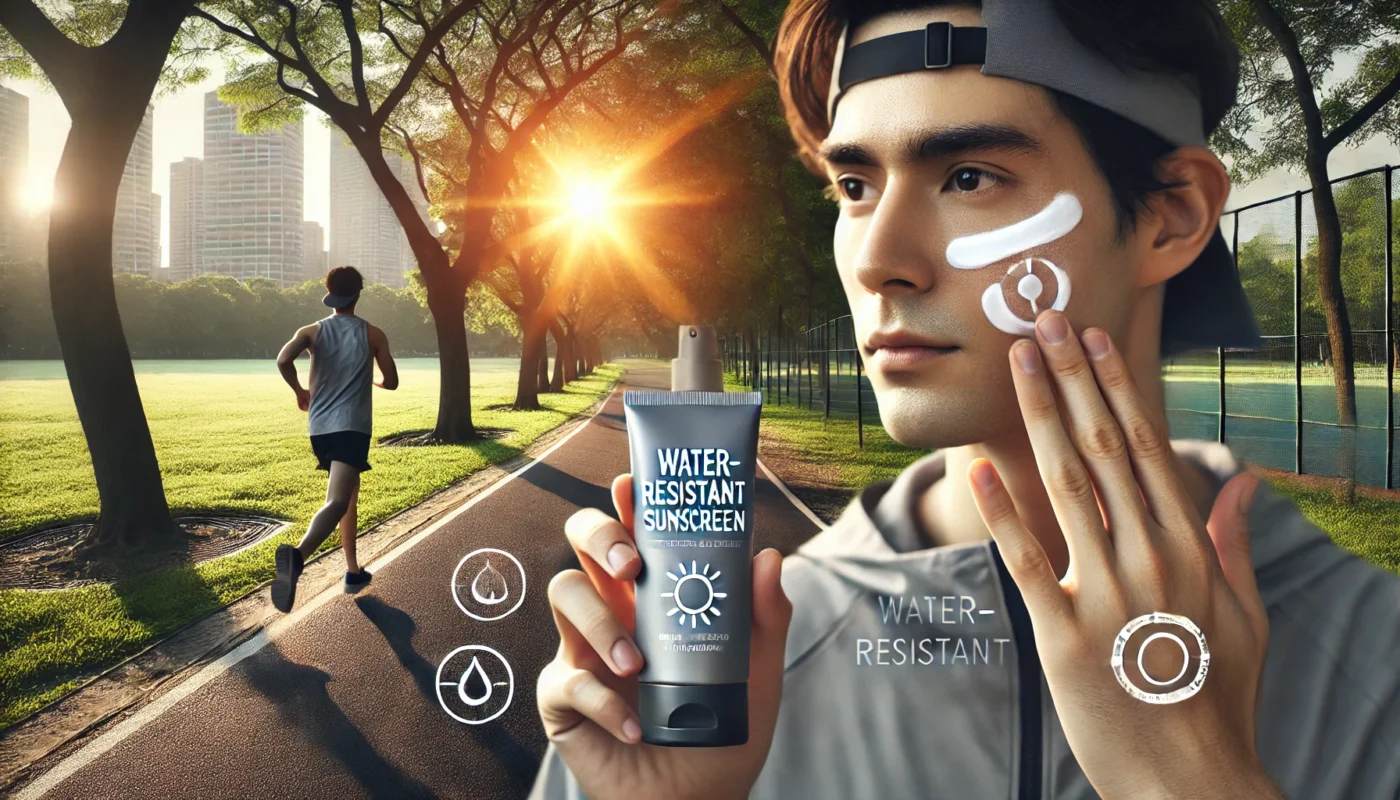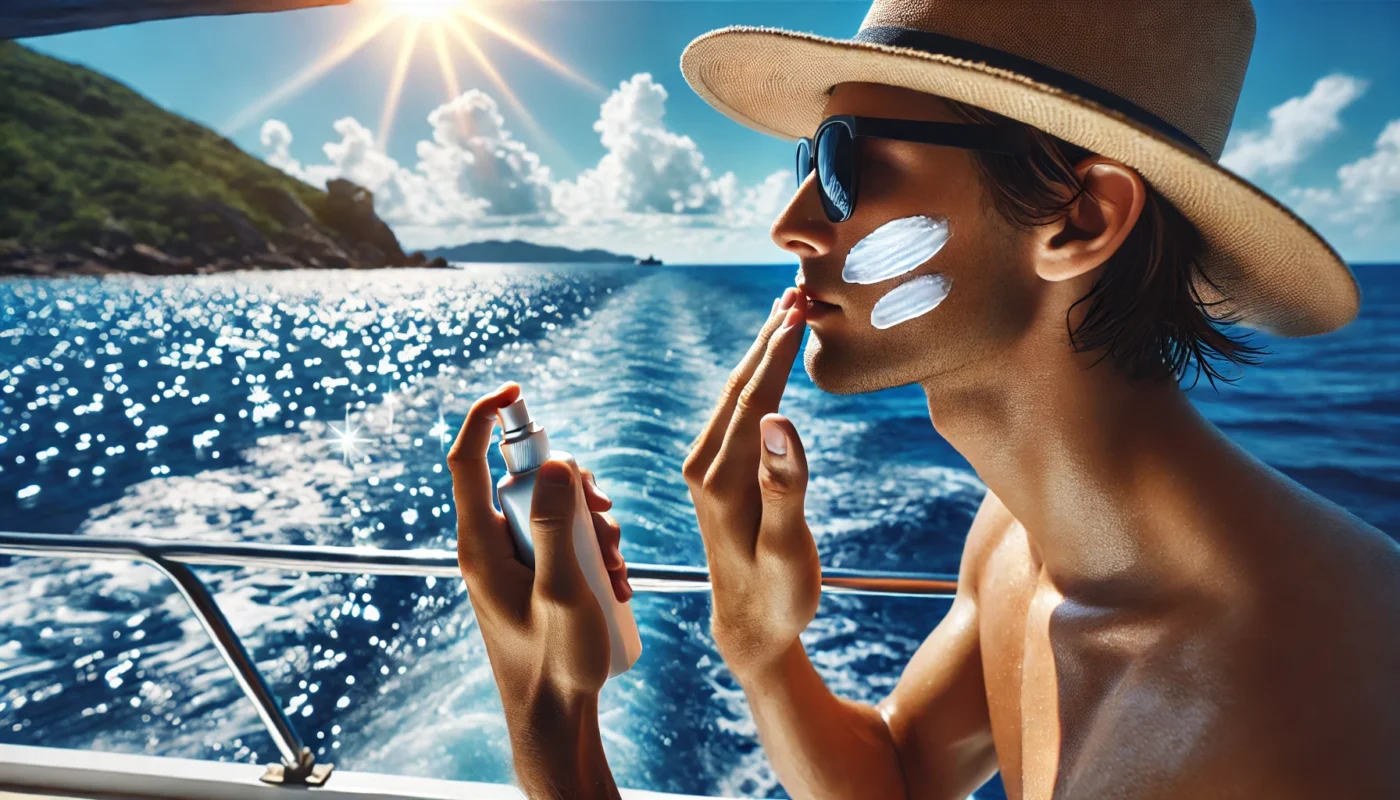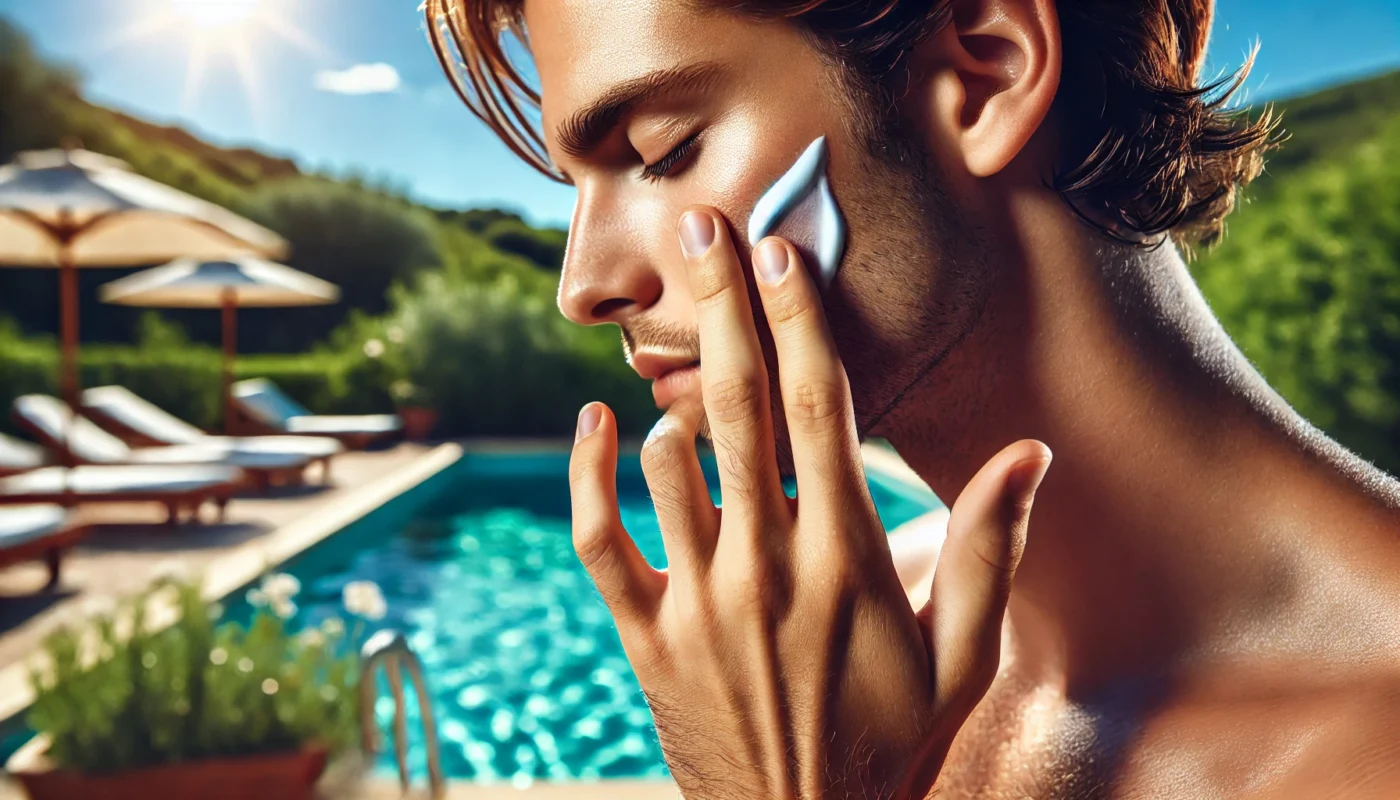Sun protection is a crucial aspect of skin health. It’s not just about avoiding sunburns, but also about preventing skin cancer and premature aging.
Water-resistant sunscreen for the face is a game-changer. It’s designed to stay on your skin longer, even if you sweat or swim.
But what does water-resistant really mean? And how does it differ from waterproof sunscreen?
This guide will answer these questions. It will also explain the importance of SPF and broad-spectrum protection.
We’ll delve into the considerations for different skin types. From oily to dry, sensitive to acne-prone, we’ve got you covered.
You’ll learn about the pros and cons of mineral and chemical sunscreens. Plus, we’ll highlight the key ingredients to look for in a water-resistant sunscreen.
Finally, we’ll review the top-rated water-resistant sunscreens for your face. You’ll get practical advice on application, daily usage, and how to choose the best product for your needs.
Let’s dive in and uncover the science and practicalities of water-resistant facial sunscreens.
You may also like: Essential Summer Skin Care Tips
Understanding Water Resistance in Sunscreen
Choosing the right sunscreen involves more than just considering SPF. It also requires understanding water resistance.
Sunscreens labeled as water-resistant are designed to remain effective for a duration after exposure to water or sweat. This feature makes them ideal for active lifestyles and outdoor activities.
Typically, these sunscreens provide protection for up to 40 or 80 minutes of water or sweat exposure. Reapplication after this period ensures continued protection.
Here are key points to remember about water-resistant sunscreens:
- Duration: Effective for either 40 or 80 minutes in water.
- Reapplication: Necessary after swimming, sweating, or towel drying.
- Activity Suitability: Ideal for sports, swimming, and outdoor exercises.
Active individuals benefit significantly from water-resistant sunscreens. They stay protected during workouts or swims without frequent breaks for reapplication.
Broad-spectrum water-resistant sunscreens shield against both UVA and UVB rays. It’s important to choose a sunscreen that offers comprehensive protection.
SPF and Water Resistance: What Does It Mean?
SPF stands for Sun Protection Factor. It measures the level of protection against UVB rays, which cause sunburn. The higher the SPF, the greater the protection offered.
Water resistance in SPF products indicates their ability to maintain their SPF levels during exposure to water. A label reading “SPF 50 water-resistant 80 minutes” suggests reliable protection even during prolonged water exposure.
However, water resistance doesn’t mean waterproof. Sunscreens still need reapplication after prolonged exposure to water to maintain effectiveness.
The combination of a high SPF and water resistance is essential for thorough protection during outdoor activities. Ensuring your sunscreen meets these criteria offers peace of mind on hot, sunny days.
Water-Resistant vs. Waterproof: Clearing the Confusion
Many people use “water-resistant” and “waterproof” interchangeably. However, the FDA discourages the use of “waterproof” in sunscreen labeling. No sunscreen can be entirely waterproof.
Water-resistant sunscreens have been tested to ensure they maintain their SPF protection level even when exposed to water. This is true for a specified duration, commonly 40 to 80 minutes.
The term “waterproof” might imply complete immunity to water effects, which is misleading. Thus, understanding the distinction ensures you don’t skip the necessary reapplication step.
Choosing a true water-resistant sunscreen and reapplying as needed aligns with best practices for effective sun protection. It’s a simple step that can significantly enhance skin health.
The Importance of Sun Protection for Skin Health
Protecting your skin from the sun is vital to overall skin health. The sun’s rays can cause significant damage over time.
Unprotected exposure can lead to severe consequences, including skin cancer and premature aging. Sunscreen is a simple yet effective barrier against these risks.
Regular sunscreen use reduces the likelihood of skin damage. Sun protection isn’t just for the beach—it’s a daily necessity.
Besides skin cancer prevention, sunscreen helps maintain youthful skin. It combats signs of aging like fine lines and wrinkles.
Consider these key benefits of using sunscreen:
- Reduces risk of skin cancer.
- Prevents premature aging signs.
- Shields from harmful UVA and UVB rays.
- Maintains even skin tone by preventing sunspots.
- Supports overall skin health and appearance.
Incorporating sunscreen into your daily routine is a small change with big benefits. The advantages far outweigh the brief effort required.

How Sunscreen Protects Against Skin Cancer and Premature Aging
Sunscreen acts as a protective shield. It blocks and absorbs harmful UV rays before they can damage skin cells. This helps reduce the risk of developing skin cancer.
By preventing excessive UV exposure, sunscreen also guards against premature aging. UV radiation accelerates the breakdown of collagen in the skin, leading to wrinkles.
Furthermore, consistent use keeps skin texture smooth and even. It prevents sunspots and discoloration, allowing your natural glow to shine through.
This protection is crucial for long-term skin health. Sunscreen is not just a preventive measure but an investment in maintaining youthful, healthy skin.
Broad-Spectrum Protection: UVA and UVB Explained
Understanding broad-spectrum protection is essential for effective sun safety. Sunscreens labeled broad-spectrum protect against both UVA and UVB rays.
UVA rays penetrate the skin deeply. They cause premature aging and contribute to wrinkles and skin damage over time.
UVB rays, on the other hand, are primarily responsible for sunburn. They play a major role in the development of skin cancer.
A broad-spectrum sunscreen provides comprehensive protection. It prevents damage from both kinds of UV rays, ensuring your skin remains healthy.
Choosing a broad-spectrum product equips you to face the sun’s challenges. It’s an all-in-one approach to maintaining skin health and youthfulness.
Choosing the Right Water Resistant Sunscreen for Your Face
Selecting an effective water-resistant sunscreen for your face can seem complex. With so many options, knowing what to look for helps streamline your decision.
Start by considering your lifestyle. Active individuals may need a formula that withstands sweat and water for prolonged periods.
Next, factor in skin type. Whether oily, dry, sensitive, or combination, there’s a sunscreen to suit your needs. Non-comedogenic options are ideal for oily or acne-prone skin.
Keep an eye on SPF levels. A minimum of SPF 30 is recommended for adequate protection. Higher SPF offers more comprehensive coverage, essential for extended sun exposure.
Here’s a quick checklist for choosing the right sunscreen:
- SPF of at least 30
- Broad-spectrum protection
- Water-resistant for up to 80 minutes
- Suitability for your skin type
- Non-comedogenic and hypoallergenic formulas
Price and brand reputation also matter. Find a balance between high quality and affordability that matches your budget.
Ultimately, the best sunscreen is one you’ll use consistently. A comfortable, effective product makes it easier to integrate into your daily routine.
Considerations for Different Skin Types
Understanding your skin type is crucial when choosing sunscreen. Each type has distinct needs for optimal protection and comfort.
For oily skin, opt for lightweight, oil-free formulas. Non-comedogenic options prevent pore-clogging, reducing the risk of breakouts.
Individuals with dry skin benefit from hydrating sunscreens. Look for moisturizing ingredients like hyaluronic acid or ceramides.
Sensitive skin types need gentle formulations. Hypoallergenic and fragrance-free products minimize irritation and allergic reactions.
Combination skin can require a balanced approach. You may need to try several products before finding one that harmonizes with both oily and dry areas.
Customizing your sunscreen choice ensures maximum protection while catering to individual skin needs, enhancing both efficacy and comfort.
Mineral vs. Chemical Sunscreens: Pros and Cons
Sunscreen formulations fall into two main categories: mineral and chemical. Each type has distinct advantages.
Mineral sunscreens, containing zinc oxide or titanium dioxide, sit on the skin’s surface. They physically block UV rays.
Pros include broad-spectrum protection and suitability for sensitive skin. They often leave a white cast, however, which can be less appealing for daily use.
Chemical sunscreens contain organic compounds like oxybenzone. These absorb UV radiation, converting it to heat and releasing it from the skin.
Their benefits include thinner formulations that blend seamlessly. They can sometimes cause irritation, especially for sensitive skin.
Choosing between them depends on personal preference and skin sensitivity. Both types can offer effective protection if used correctly.
Ingredients to Look for in Water Resistant Sunscreen
Key ingredients boost the efficacy of water-resistant sunscreens. Look for broad-spectrum agents like zinc oxide or avobenzone.
Antioxidants are beneficial. Vitamins C and E can provide additional protection against environmental damage.
Moisturizing agents like hyaluronic acid support skin hydration. This is especially helpful for those with dry skin types.
Fragrance-free formulations reduce irritation potential. This is crucial for sensitive or allergy-prone skin.
Understanding these ingredients helps you make informed decisions. It ensures your sunscreen meets both protection and skincare needs.
Application Tips for Maximum Protection
Proper application of water-resistant sunscreen is vital for optimal skin protection. It’s not just about choosing the right product; how you use it matters significantly.
Before applying sunscreen, cleanse your face thoroughly. This removes oil and dirt, creating a clean slate for even application.
Apply sunscreen 15 to 30 minutes before sun exposure. This time allows the skin to absorb the active ingredients effectively.
Use an adequate amount of sunscreen. For the face, a quarter teaspoon is recommended to ensure coverage.
Consider layering sunscreen under your makeup. This shields your skin without disrupting makeup application.
Remember to reapply every 40 to 80 minutes if you’re swimming or sweating heavily. Regular reapplication maintains the sunscreen’s protective barrier throughout the day.
How to Apply Sunscreen Correctly
Applying sunscreen correctly maximizes its efficacy. Begin with your face, focusing on areas that receive the most sunlight.
Dispense a quarter teaspoon of sunscreen onto your fingertips. Gently dab onto key areas: forehead, cheeks, nose, and chin.
Spread the product evenly across your face. Ensure all exposed skin is covered, including the ears and neck.

Don’t forget about the hairline and behind the ears. UV rays can reach hidden spots, causing unseen damage.
Lastly, allow the sunscreen to dry. This ensures it doesn’t mix with sweat or water immediately upon going outside.
Integrating Sunscreen into Your Daily Routine
Incorporating sunscreen into your daily skincare routine is essential for consistent protection. The aim is to make it a seamless habit.
Apply sunscreen as the final step in your skincare routine, after moisturizer and before makeup. This ensures optimal skin protection.
Setting your sunscreen next to other daily products is a simple reminder. Out of sight often means out of mind.
Consider carrying a travel-sized sunscreen in your bag. This allows for convenient reapplication when you’re on the go.
Ultimately, treating sunscreen application as a non-negotiable part of your daily regimen fosters better skincare habits and long-term sun protection.
Top-Rated Water Resistant Sunscreens for the Face
In the quest for the best water-resistant sunscreens, a few products stand out. These selections offer excellent protection and have garnered positive feedback from users and dermatologists alike.
Finding the right sunscreen involves balancing effectiveness, skin type compatibility, and personal preferences. The best picks combine these factors effectively.
Reviews and Recommendations
Neutrogena Hydro Boost Water Gel Lotion SPF 50: Known for its lightweight texture, this sunscreen is praised for leaving no greasy residue. It provides reliable water-resistant protection for up to 80 minutes.
EltaMD UV Sport Broad-Spectrum SPF 50: This is favored by athletes for its durability during intense activities. It is formulated with zinc oxide, providing strong defense against UVA and UVB rays.
La Roche-Posay Anthelios Melt-in Milk Sunscreen SPF 60: Users commend its ability to absorb quickly into the skin. It offers a broad-spectrum shield and is recommended for sensitive skin due to its hypoallergenic properties.
Coppertone Sport Sunscreen Lotion SPF 50: This option is popular for outdoor sports and water activities. It offers long-lasting protection and withstands sweat.
Australian Gold Botanical Sunscreen Mineral Lotion SPF 50: It’s ideal for those preferring mineral sunscreens. The botanical ingredients are soothing, making it a smart choice for sensitive skin types.
Price and Value Comparison
Price is a crucial factor when choosing sunscreen. However, the value lies in how well a product meets individual needs and preferences.
Neutrogena’s Hydro Boost comes at a moderate price, making it accessible yet effective for many users. EltaMD offers a higher price point but delivers excellent performance, often justified by its long-lasting formula.
La Roche-Posay is priced higher, reflecting its advanced formulations suitable for all skin, especially sensitive individuals. On the other hand, Coppertone Sport provides a budget-friendly option without compromising on quality. Lastly, Australian Gold offers a balance of price and performance, particularly for those requiring a gentle yet potent formula.
Selecting the right water-resistant sunscreen involves comparing not only costs but also the benefits each product uniquely provides.
Additional Considerations and Tips
When choosing a sunscreen, consider more than just the SPF level. Other factors can influence its effectiveness and suitability for your lifestyle.
The correct application is crucial to ensure full protection. Applying the recommended amount and reapplying every two hours can significantly enhance protection.
Look for products labeled “broad-spectrum” to guard against both UVA and UVB rays. Additionally, choose formulations designed for your skin type to prevent adverse reactions.
Being informed about the products helps you make better choices. Here are some factors to keep in mind:
- Label Clarity: Ensure the product clearly states “water-resistant” with the duration indicated.
- Skin Compatibility: Select products suitable for oily, dry, or sensitive skin.
- Application Ease: Consider textures and finishes that suit your daily routine.
Also, consider the balance between chemical and mineral sunscreens. Each type has its own benefits and drawbacks.
Choosing wisely can elevate not only your skincare routine but your overall wellness strategy, supporting both health and environmental consciousness.
Sunscreen and Environmental Impact
Some sunscreen ingredients can negatively affect marine ecosystems. Chemicals like oxybenzone and octinoxate, found in many sunscreens, contribute to coral bleaching and harm aquatic life.
To mitigate this impact, seek “reef-safe” sunscreens. These formulations exclude harmful chemicals and focus on eco-friendly ingredients.
Moreover, mineral sunscreens with zinc oxide or titanium dioxide are generally safer for marine environments. They form a physical barrier and pose fewer risks to marine ecosystems.
Awareness of environmental effects helps in selecting sunscreens that protect both your skin and natural habitats. This conscious approach aligns personal health with ecological responsibility.
Sunscreen for Special Populations: Children, Elderly, and Post-Surgery
Different life stages and health conditions require special sunscreen considerations. For children, opt for broad-spectrum sunscreens with a SPF of at least 30. Pediatricians often recommend mineral-based formulations due to their gentle nature.
Elderly skin may become thinner and more sensitive. A high SPF sunscreen with moisturizing properties can help maintain skin health and prevent damage.
After surgery or medical procedures, protecting healing skin is vital. Consult healthcare providers to recommend suitable sunscreens that will not irritate or interfere with recovery.
Keeping these factors in mind ensures that each demographic receives adequate sun protection. Adapting sunscreen choices to individual needs promotes safer outdoor activities and supports long-term health benefits.
Conclusion and Final Thoughts
Choosing the right water-resistant sunscreen for your face is key to maintaining good skin health. This not only protects against harmful UV rays but also caters to your skin’s unique needs.
Whether you’re an outdoor enthusiast or someone looking to enhance your skincare regimen, a suitable sunscreen is essential. Understanding the nuances between water-resistant and waterproof options aids in making informed decisions.

Prioritizing sun protection offers numerous benefits. It plays a vital role in preventing skin damage, keeping your skin youthful, and supporting overall wellness. Always choose wisely, considering both personal health and environmental impacts, for a balanced approach to well-being.
waterproof spf for face, water resistant facial sunscreen, best waterproof sunscreen for face, waterproof sunscreen for sensitive skin, broad-spectrum protection, sun protection, sunscreen application tips, mineral sunscreen, chemical sunscreen, skincare routine, skin health, UV protection, sunburn prevention, eco-friendly sunscreen, reef-safe sunscreen, moisturizing sunscreen.
Further Reading
Wirecutter: The Best Sunscreens for Your Face
ScienceDirect: Sunscreens: A comprehensive review with the application of nanotechnology
The Pink Foundry: Everything you need to know about waterproof sunscreens
waterproof spf for face, water resistant facial sunscreen, best waterproof sunscreen for face, waterproof sunscreen for sensitive skin, broad-spectrum protection, sun protection, sunscreen application tips, mineral sunscreen, chemical sunscreen, skincare routine, skin health, UV protection, sunburn prevention, eco-friendly sunscreen, reef-safe sunscreen, moisturizing sunscreen.
Important Note: The information contained in this article is for general informational purposes only, and should not be construed as health or medical advice, nor is it intended to diagnose, prevent, treat, or cure any disease or health condition. Before embarking on any diet, fitness regimen, or program of nutritional supplementation, it is advisable to consult your healthcare professional in order to determine its safety and probable efficacy in terms of your individual state of health.
Regarding Nutritional Supplements Or Other Non-Prescription Health Products: If any nutritional supplements or other non-prescription health products are mentioned in the foregoing article, any claims or statements made about them have not been evaluated by the U.S. Food and Drug Administration, and such nutritional supplements or other health products are not intended to diagnose, treat, cure, or prevent any disease.

